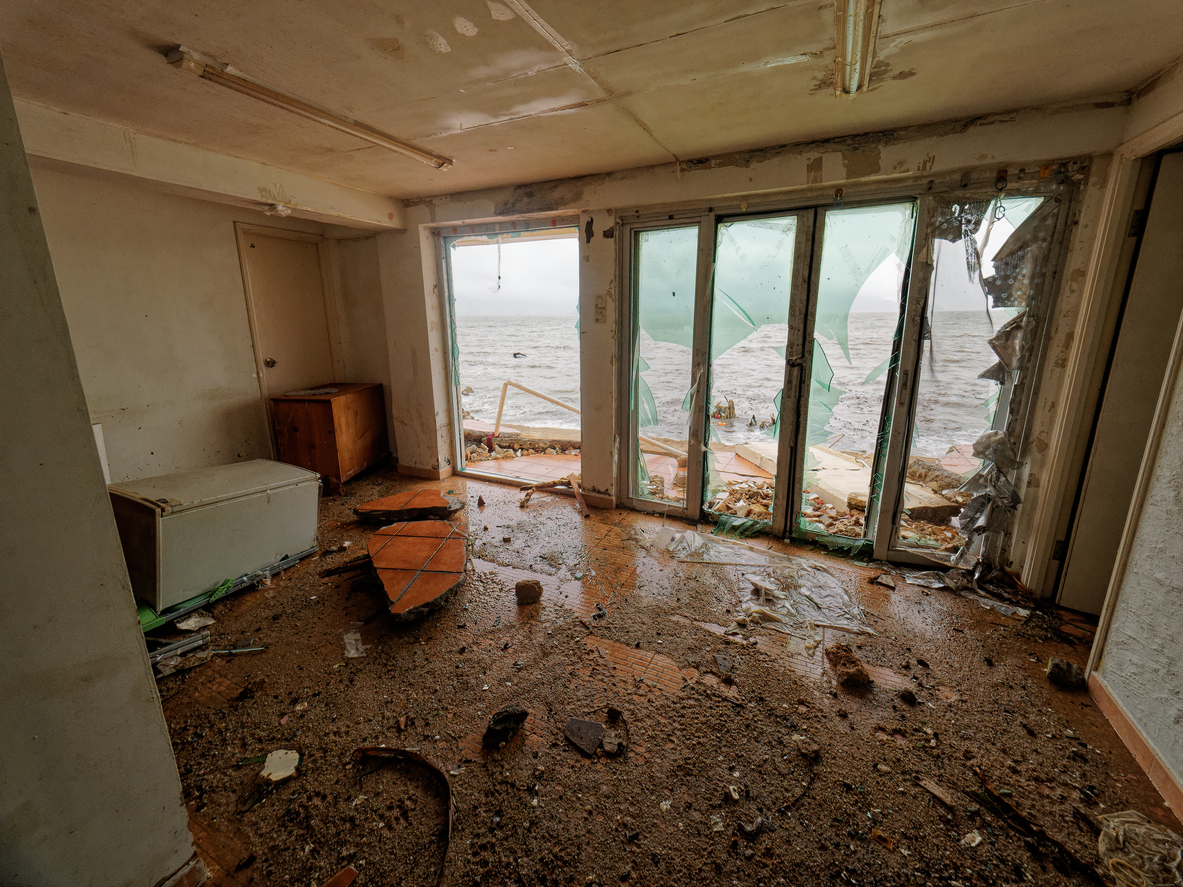The First Party Claims Conference in Providence, Rhode Island was very much a success. I was late to the event and missed hearing a presentation where a sponsor said that meeting with legislators and insurance regulators is a waste of time. Ironically, I was late because I was in Tallahassee testifying as an invited panelist to represent the policyholder’s viewpoint before the Florida Senate Banking and Insurance Committee. Obviously, I could not disagree more with this sponsor and I believe their viewpoint is simply wrong and dangerous. The one person and organization that has been taking action, getting pro-policyholder laws passed, and stopping bad proposed legislation with more success than anybody is Amy Bach of United Policyholders.
United Policyholders has taken a stance to stop Protection Gaps. The Protection Gap is a problem for the entire insurance industry because offering needed coverage and getting it to the policyholder is the entire purpose of what insurance is supposed to do. Without enough benefits, policyholders can not hire contractors to properly rebuild their property. Without benefits being paid fully and quickly, financial peace of mind is lost.
Amy was invited and made a presentation with other insurance leaders to the National Association of Insurance Commissioners (NAIC) this August. A copy of the presentation is attached.
Here are the NAIC Committee notes from that presentation and I would suggest you carefully see how well Amy Bach is able to respond to even the most complex question posed:
Amy Bach (United Policyholders) said United Policyholders assists consumers with insurance information after disasters. She is looking to improve the post-disaster landscape and look at how much costs are being picked up by private insurance. She said the work in developing the private flood insurance market is very important, as only 5 million Americans have National Flood Insurance Program (NFIP) policies.
Ms. Bach said she hopes a conversation can start in looking for solutions to protecting citizens from natural disaster risks. She said the majority of U.S. homes are underinsured. Many have insured values that are too low to cover reconstruction costs in the event of a total loss. Ms. Bach said many perils are subject to high deductibles, and the majority of homes are not protected for flooding or earthquake. She said this has had a substantially negative impact on local, state and federal governments and disaster-impacted communities.
Ms. Bach said co-insurance clauses are supposed to prevent underinsurance, but they are not doing that currently with respect to California wildfires. She said if it were not for mortgage requirements to buy home and flood insurance, there would be far more uninsured homes. She said banks are not interested in mandating earthquake or flood insurance in lower risk areas. She said all-risk policies are increasingly less common, while named-peril polices are more common. She said replacement cost value (RCV) has replaced actual cash value (ACV) as the norm, but excluded perils, depreciation and deductibles thwart the goal of affordable policies.
Ms. Bach said insurer ads and agents induce consumer reliance that the policy will restore the home to pre-loss condition, but policy conditions and chronic inadequate limits render that reliance misplaced. She said solutions that have been attempted to close the protection gap include disclosures, public education, mandatory coverage, regulations requiring accurate estimating at point of sale, and mandated minimum and extended coverages. She said California has a law requiring that insurers conduct a complete calculation on what it would cost to rebuild a house. She said one thing not tried is making the insurer legally accountable for insuring the dwelling to value unless the property owner expressly declines it.
Ms. Bach said more than half of U.S. homes are insured below their RCV. Reasons include cost considerations and misplaced trust regarding adequacy of coverage and agents, and insurers not held accountable if underinsured. She said we do not know
if full coverage is affordable for all or if it means the same thing to all people. She said extended replacement coverages are more available. These coverages allow an individual to buy a kicker that gives extra coverage if needed.
Ms. Bach said United Policyholders surveys individuals after catastrophes to see if they were properly insured, and around two-thirds normally say they were not properly insured to rebuild their home. She said policy limits are often below the cost to rebuild, and extended replacement coverage endorsements and inflation adjustment formulae are not sufficient to cover rebuilding. She said protection gaps occur because some policies only pay ACV on roofs over ten years old. High deductibles and unexpected exclusions or limitations also contribute to the protection gap.
…
Ms. Bach said a “clarity law” regarding pricing seems to have helped home insurance affordability in Alabama. She said surplus lines insurers are picking up more and more risks, which has pros and cons. She said realtors, community, and grass roots groups are fighting escalating home and flood premiums. She said society has to avoid jeopardizing home ownership for people who have lived in a risky area for many years. She questioned whether a financial assistance program for people who cannot afford insurance might be viable.
Ms. Bach said we cannot control weather, force for-profit companies to insure risks that will jeopardize their solvency, or force property owners to make improvements they cannot afford to make. However, she noted that society can prevent panic-based mass non-renewals, reject excessive rate increases and policy forms with overly broad exclusions, restore consumers’ trust in the value of property insurance, and facilitate home hardening and risk reduction. She said state insurance regulators have to consider whether full insurance and affordable home insurance are mutually exclusive and whether state legislation might affect affordability and availability of home insurance in the face of climate change, modeling, drones, data mining, and increased consumer mistrust of insurers.
…
Superintendent Dwyer said she would like industry representatives to present on these same underinsurance issues during the Fall National Meeting in order to outline solutions they might have. She asked about a California statute requiring insurers to conduct a complete calculation on what it would cost to rebuild a house. Ms. Bach said the estimate is required, but it is not known if it has had any effect. Commissioner Lara said the department is working with the legislature in looking at community wide mitigation standards.
Superintendent Dwyer said insurers often automatically increase the amount of insurance, and this is probably through a software tool. Ms. Bach said some insurers do a better job than others on this, and only a handful of insurers look critically at the software. She said a diligent agent might override what the software recommends. Superintendent Dwyer asked if the software is good enough or needs to be overridden. Ms. Bach agreed that it often needs to be overridden.
Superintendent Dwyer said a parametric product is intriguing when it can help with a hurricane deductible. Ms. Bach said a parametric product can be beneficial in non-catastrophe losses, such as with earthquakes. She said parametric insurance is not necessarily great for core coverages, but it can be helpful in providing assistance in having some coverage instead of nothing.
Superintendent Dwyer said parametric insurance can be helpful when combining it with other coverage. Ms. Bach said sometimes a parametric product will give a policyholder something to at least get a roof back over one’s head.
Director Wing-Heier said underinsurance is not always about the limits but what is excluded from the coverage, such as septic tanks or other exclusions. She said condo associations often might be underinsured. Ms. Bach said there used to be a lot of valued policy states where at least a person knew what they were getting, but now policies are very complicated. She would like to see dialogue include how society can innovate to make sure people can buy essential coverage for their assets.
Commissioner Ridling said underinsurance is an issue, and insurers are constantly trying to keep homeowners at the proper value to replace their home. He said there is still a misconception with consumers about replacement cost and the value of their home, and people frequently do not understand RCV and what is needed to rebuild their home. Superintendent Dwyer said sometimes citizens complain that the insurer is wanting the insured value to be too high.
Mr. Byrd said inflation guard raises limits, and he asked whether this is calculated into Ms. Bach’s numbers of underinsurance. She said surveys show that people believe they are underinsured after catastrophes. She said most policies are sold with inflation guards. She said extended replacement coverage provisions have not been working, as homeowners are still underinsured with these provisions even when it is a new policy. She emphasized that this phenomenon occurs with total losses.
Commissioner Lara said there is no authority to mandate more accurate coverages, but he wondered how consumers could be educated to obtain better limits. Ms. Bach said amounts probably cannot be required, and it is on the insurer to accurately project the RCV of the property. She said the next step would be for the legislature to say it is the insurer’s obligation to recommend the proper coverage, but that affects cost. She said if an insurer guesses wrong, they have to make up for it; and if and insured does not want the full coverage, it would be on them.
Superintendent Franchini asked about lenders. Ms. Bach said lenders usually require coverage in the amount of the loan. She said she wonders why lenders have not required earthquake insurance when the property is on fault line. Superintendent Franchini asked about the difference in conditions policies and having all perils policies. Ms. Bach she said she thinks a discussion should be held about all perils policies.
The NAIC makes model laws for legislatures. They make model regulations which the individual commissioners can set as policy. The Unfair Claims Settlement Practice Act was made by the NAIC. United Policyholders is an active voice for the policyholder at these meetings and helps set the agenda for making pro-consumer legislation and regulation a reality.
United Policyholders even has the support of academia. It has partnered with Rutgers Center for Risk and Responsibility to promote the Essential Protections for Policyholders which proclaims:
Homeowners need to be able to buy good insurance coverage and understand what they are buying. When losses occur, insurance companies need to deliver on the protection they have promised. The Essential Protections for Policyholders project analyzes and recommends state laws that make sure that happens.
Merlin Law Group attorneys are proud sponsors of United Policyholders. I am on the Board of Directors and Merlin Law Group’s San Francisco-based Dan Veroff even worked on the staff for United Policyholders before going into private practice representing policyholders.
The Protection Gaps issue is very important. United Policyholders, the American Association of Public Insurance Adjusters, and Rutgers Center for Risk and Responsibility have combined forces and are taking action on these important issues. Unlike some that whine about the way things are, Amy Bach, the United Policyholder staff, its partners, and volunteers are relentless. They take action and change the status quo.
Thought For The Day
Inaction breeds doubt and fear. Action breeds confidence and courage. If you want to conquer fear, do not sit home and think about it. Go out and get busy.
—Dale Carnegie




